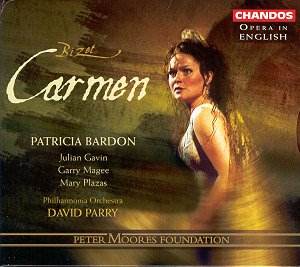2/26/11 – Bizet: Carmen
As a musician I tell you that if you were to suppress adultery, fanaticism, crime, evil, the supernatural, there would no longer be the means for writing one note.- Georges Bizet
Listening to the opening prelude of Carmen, two things come to mind. First off, why is this a “Prelude,” and not an “Overture?” Second of all… I’ve heard this before. It’s like the Nirvana album from last month – I’ve been subconsciously exposed to so much of the music here that it seems familiar. I knew "L'amour est un oiseau rebelle" coming in; one of the most well-loved arias in operatic literature. But the carnival theme, the toreador’s song, and the theme of fate as it is so called, they are all as equally recognizable. Bizet’s flamboyant writing is a far cry from the heavy romanticism of Wagner, but its lighter tone in no way undermines the drama contained within his musical phrases.
Once again, I confess to taking a shortcut here – while I considered reviewing a “highlights” collection from the opera, I opted instead to listen to the whole show, albeit an English translation. It’s hard enough going from a staged production to an audio recording and losing the visual. Once you remove the language component as well, it might just as well be instrumental. And while in a perfect world, I’d be watching a performance (live, since we’re dreaming) in French with supertitles in English, listening to a CD in the English will have to suffice for today.
Dramatically, Carmen is a compelling story, far ahead of its time in its portrayal of deeper three-dimensional female characters, and (contrary to type,) shallow and dim male roles. Likewise, Carmen depicts a much more pedestrian lifestyle than most opera – instead of the comings and goings of nobles and their courts, the titular role is that of a gypsy vagabond (who seduces and outwits ranks of the Spanish army.) In fact, the material is often compared to Puccini’s La Boheme for that same reason. While it’s nice to take opera off its lofty pedestal from time to time, I confess, I also miss the grandeur of Wagner’s gods and their exploits of epic proportions. I guess I can’t have my cake and eat it too.
Musically, Bizet’s score seems to owe more to Chopin and Brahms than to Mahler and Wagner. His orchestrations are more subtle than the massive forces required for the latter, but at the same time, you can sense the shifting roles within the orchestra in this later romantic work. The upper winds are given the same level of prominence as the strings, and Bizet’s timbral palate is far more varied than the classical era composers who had gone before. Simmilarly, the harp and flute duet opening the third act is strikingly beautiful.. His vocal writing, in particular the quartet in the second act and the opening chorus of the third is rather complex for opera, and his orchestrations are elegant and effective.
Once again, I seem to be at a loss – not having seen the staged production, there’s a lot of the experience I know I’m missing, and tackling individual elements seems to daunting because there’s so much to address. Therefore, once again, this posting ends up being somewhat brief – for both a lack of things to say and no sense of where to begin.
Tomorrow – The Trombone Master (J. J. Johnson)
Next week – Ockeghem: Missa ðe plus en plus

No comments:
Post a Comment